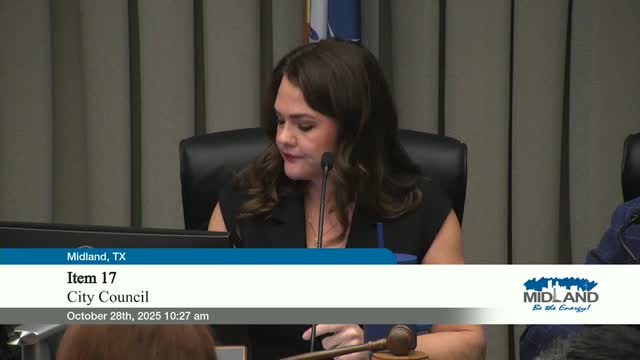Council declines to act on two preliminary plats that rely on groundwater, citing long‑term recharge concerns
Get AI-powered insights, summaries, and transcripts
Subscribe
Summary
Councilors expressed concern about approving two preliminary plats outside city limits that rely on private groundwater; staff said the plats meet state law, but several councilors said long‑term water viability remains uncertain and took no action.
Midland City Council on Oct. 28 declined to take affirmative action on two preliminary plats proposing development outside the city limits that would rely on private groundwater, citing concern about long‑term aquifer recharge and the city’s limited authority under state law.
City staff explained the first plat (CEMA Development addition, roughly 35.98 acres, located about two miles south of city limits along SH 349) would divide the property into three lots for future commercial uses and, because it lies outside the city, the developer requested a deferral to use groundwater. “They have completed a groundwater study. It has been certified, and it does show that there is sufficient ground water for this specific development, which meets state law requirements,” a staff member told council. Staff said the plat otherwise meets local code and that by operation of law, if the council took no action it would still be approved, but councilors considered the broader policy implications.
Several council members said state law limits the city’s ability to block plats that satisfy technical standards but that the council did not want to facilitate development whose long‑term water viability could not be demonstrated. One councilor said the groundwater studies did not account for recharge rates and warned the city should not “facilitate developments where there is not long term water.” Another councilor urged the Legislature to revisit the standards that remove municipal control over such plats.
Council members expressed similar concerns about a larger preliminary plat (the Patch addition, about 148.76 acres) that proposes industrial uses outside the city; they noted industrial water demand is harder to predict and could be substantially higher than residential demand. Because no councilor moved the item to a vote and staff said the plats met state requirements, the council’s lack of action left the filings to proceed under state law rather than through a city‑approved annexation or connection to municipal water.
Why it matters: The council’s comments reflect a recurring tension in fast‑growing West Texas communities where development beyond city limits may rely on private groundwater. Councilors said the issue has implications for long‑term regional planning, liability and community stewardship of water resources.
Staff did not recommend denial; rather, the discussion centered on policy options and the limits of local authority. Council members asked staff to continue exploring legislative options and long‑term strategies for protecting regional water supplies if future statutory changes allow greater local oversight.
